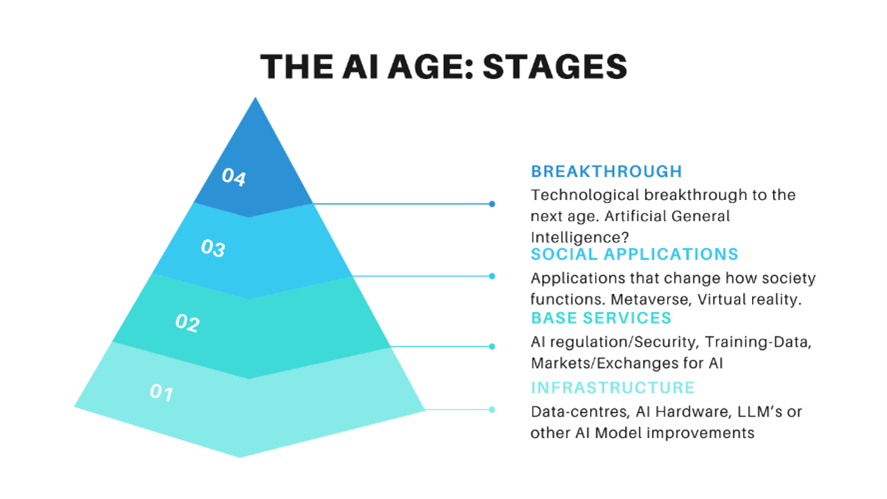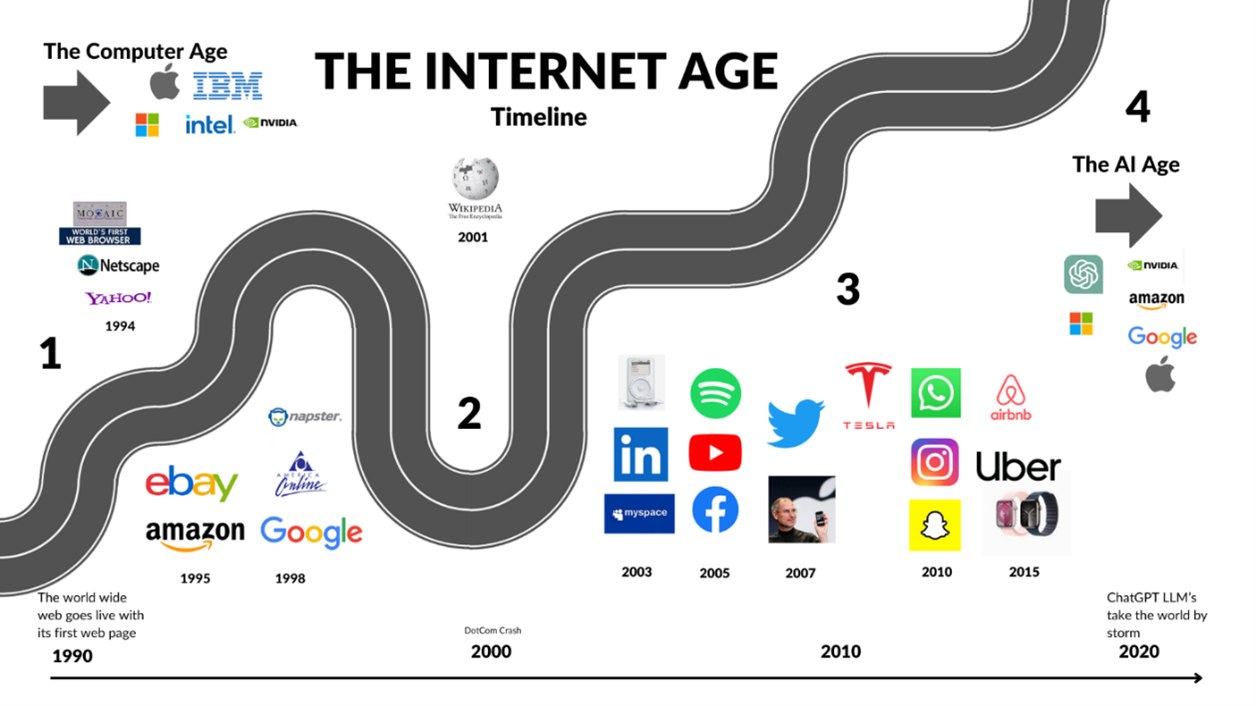Investing in AI's future: Lessons from the internet boom
The advent of Artificial Intelligence (AI) beckons a new era of technological innovation, akin to the transformative wave of the Internet.
Much like the Internet era burgeoned from the preceding computer age, the AI epoch is set to flourish upon the technological bedrock laid down by the Internet age.
This evolutionary trajectory carves out a distinct investment landscape for AI, encapsulating a myriad of opportunities for discerning investors. The narrative of the transition from the computer to the Internet age offers invaluable lessons for navigating the burgeoning AI investment frontier.
- Infrastructure: Just as a strong foundation is crucial for a building, the infrastructure stage establishes the basic yet essential platforms for AI. This includes Data Centers to store and manage vast amounts of data, specialized AI hardware to process this data, and Large Language Models (LLMs) that act as the brainpower to make sense of the data.
- Base Services: Much like setting up plumbing and electrical systems in a building, this stage involves setting up regulatory, security, and alignment frameworks. Ensuring a safe, ethical, and effective environment for AI to operate is akin to ensuring all basic services in a building are functioning correctly.
- Tertiary Services: This stage is like adding functional and aesthetic features to a building. It’s about creating innovative applications that leverage AI to enhance societal interactions, much like a well-designed building enhances living or working experiences. Technologies like the Metaverse and Augmented Reality emerge, offering novel ways for individuals and communities to interact.
- AI and Beyond: Finally, just as architects may envision futuristic designs or expansions, this stage explores the realm of Artificial General Intelligence (AGI). It's about looking beyond the current form of AI to imagine how it might evolve, potentially leading towards a symbiotic existence with advanced AI within a digital Metaverse.

Drawing parallels from the internet revolution to examine the AI horizon
The emergence of AI today is reminiscent of the early days of the internet, with companies like Microsoft (NASDAQ: MSFT), Apple (NASDAQ: AAPL), and Nvidia (NASDAQ: NVDA) demonstrating the pivotal role of adaptability in navigating the tech evolution waves.
For instance, Microsoft welcomed the internet era by launching products like Internet Explorer, setting a digital trail for many to follow. On the other hand, IBM’s (NASDAQ: IBM) initial hesitation to step into the new digital realm led to a challenging period, showcasing the repercussions of lagging in the tech race.
Apple’s journey from a computer manufacturer to a giant in mobile tech and digital services epitomizes the essence of relentless innovation. The iPhone launch wasn’t just a milestone for Apple; it marked a defining moment in the digital era, showcasing the perfect blend of hardware and software.
Similarly, the early days of internet browsing with Mosaic and Netscape mirror the initial strides of entities like OpenAI in the AI domain. As the internet ecosystem matured, browsers like Chrome emerged, offering a refined, user-friendly experience, hinting at the potential evolution awaiting AI technologies.

The Dot-com bubble was both chaotic and enlightening, giving birth to numerous companies, but only resilient ones like Amazon (NASDAQ: AMZN) and eBay (NASDAQ: EBAY), with solid market positions and profitable models, stood the test of time.
As the internet era matured, tertiary companies like Facebook (NASDAQ: META), LinkedIn, Twitter (NASDAQ: TWTR), Netflix (NASDAQ: NFLX), and Uber (NASDAQ: UBER) emerged, each introducing transformative platforms that significantly impacted societal interactions, business networking, entertainment, and urban mobility.
Their success stories highlight the profound societal and economic transformations tech advancements can catalyse. Now, as AI continues to evolve, the lessons from the internet era, especially the rise and impact of tertiary companies, serve as a beacon.
They highlight the potential of AI to give rise to novel platforms that could once again reshape societal norms, emphasizing the need for investors to stay adaptable, foresighted, and insightful in their AI investment ventures.
The horizon of Artificial General Intelligence (AGI)
As we navigate the unfolding narrative of AI, the horizon seems to be leading towards an era of Artificial General Intelligence (AGI). The transition from Narrow AI to AGI presents a plethora of intriguing questions and potential scenarios.
- Alignment Challenge: One of the pressing concerns is the AI alignment problem. Will we be able to tailor AGI's objectives to harmonize with human values and ensure a safe co-existence? The alignment challenge represents a crucial hurdle to surmount, warranting extensive research and collaborative efforts across the globe.
- Existential Risks: AGI's potential to surpass human intelligence poses existential risks. The scenario of an uncontrolled AGI acting contrary to human interests is a compelling concern. Balancing the pursuit of AGI while mitigating existential risks requires a meticulously crafted framework of ethics, regulation, and oversight.
- Merging with AI: The idea of merging with AI, transitioning into cyborg entities, is a fascinating yet complex possibility. This potential convergence of humanity and AI could redefine the essence of human experience, offering uncharted territories of enhanced capabilities and new forms of interaction.
- Digital Metaverse: The concept of a digital metaverse, a virtual universe where individuals can interact in a myriad of ways, is gradually transitioning from fiction to a foreseeable reality. The metaverse could serve as a platform for novel experiences, business models, and social interactions, reshaping the digital landscape.
Investing in the AI frontier
Investing in AI today feels a lot like the early days of the internet, full of exciting chances but also needing a smart approach. It's wise to look at companies that are already showing they can innovate and make good use of AI. Big names like Nvidia, Facebook/Meta, and Microsoft are already deeply involved in AI and look set to stay important players in this field.
As AI grows, many new companies will pop up, claiming to have game-changing technologies. But just like in the early internet days, not all of them will have a solid plan to make money and survive in the long run. It's crucial to look past the buzz and find companies with a strong financial foundation, as they are more likely to weather the ups and downs of the market.
The journey into the AI era will uncover opportunities that we can't even see right now, especially as technology keeps getting better and faster. We're three decades into the internet age, and if AI evolves even faster, new investment chances could appear quicker than before. It's smart to spread investments across different areas of AI and stay alert to new developments and rules that could affect the market.
Investing in AI is about more than just jumping on the latest trend. It's about being part of a big change that could reshape our world, much like the internet did. With a balanced approach, careful research, and a look towards the long term, investors can find their way through the AI investment world and possibly enjoy significant rewards.
Founded by Investors for Investors
MPC Markets' mission is to empower every investor with the knowledge, tools, and guidance necessary to unlock their financial potential. Find out more.
1 topic
10 stocks mentioned

